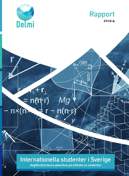Historically, the possibility to study abroad have only been an option for the wealthier segment of society. The prerequisites for this have however changed during the 20th century, today scholarships are often an important factor that enables academic mobility. In Sweden, the Swedish Institute (SI) is one of the most important scholarship grantees. The present report investigates individuals granted a mobility scholarship within the Visby programme. Over time the aim of the Visby programme has changed from export and trade, development aid (ODA) and economic growth towards regional collaboration, detente and social development. The program thus belongs to three political fields, namely a) ODA, b) internationalization of higher education, and c) public diplomacy and promoting Sweden and Swedish trade.
Some overall conclusions and recommendations
- The main results are that the composition of the scholarship holder group has changed between 1997 and 2015. Initially the group was dominated by researchers and students from the Baltic states, Poland and Russia, whereas Ukraine, Russia and Belorussia are the dominating countries today. The academic area of the scholarship holders has also shifted from a majority within engineering and natural sciences towards a majority within social sciences and humanities. The reason for this is that the initial focus on trade and economic growth within the Visby programme is now replaced by security politics and ODA. A politically formulated scholarship program such as the Visby programme and an intermediary like the SI, therefore, play important roles for the social structure of academic mobility and how this varies over time.
- Another central result is that the scholarship opens up for three different life trajectories. The majority of the respondents returned to their countries of origin (50 percent) whereas more than one quarter (27 percent) still lived in Sweden. An almost as large group (23 percent) was living in a third country, normally in Western Europe or in the USA. The same pattern is visible considering the countries where the respondents lived for a short time after their stay in Sweden. Consequently, a scholarship generates an educational capital, with value also in other countries.
- The Visby scholarships are an important part in a socially ascending society as well as for further geographical mobility. The major pull factor for coming to Sweden was the scholarship opportunity itself and the economic security they provided. A large majority of the scholarship holders also estimate that their stay in Sweden had a crucial importance for their careers, and for the ability to establish stable contacts between Sweden and their country of origin.
About the authors
The report, Academic Mobility and Swedish Scholarships (2018:2), is written by Andreas Åkerlund, associate professor in History at Södertörn Universitet, Astrid Collsiöö, PHD student at the Department of Education at Uppsala University, and Mikael Börjesson, professor at the Department of Education at Uppsala University.
Picture by Ed Robertson from Unsplash.


